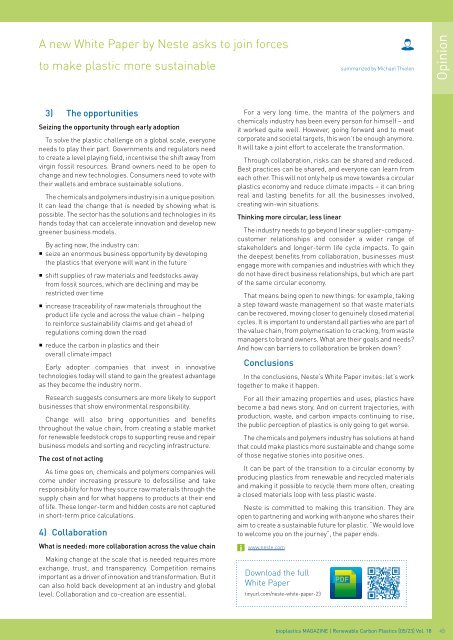Issue 05/2023
Highlights Fibres / Textiles Polyurethane / Elastomers
Highlights
Fibres / Textiles
Polyurethane / Elastomers
You also want an ePaper? Increase the reach of your titles
YUMPU automatically turns print PDFs into web optimized ePapers that Google loves.
A new White Paper by Neste asks to join forces<br />
to make plastic more sustainable<br />
summarized by Michael Thielen<br />
Opinion<br />
3) The opportunities<br />
Seizing the opportunity through early adoption<br />
To solve the plastic challenge on a global scale, everyone<br />
needs to play their part. Governments and regulators need<br />
to create a level playing field, incentivise the shift away from<br />
virgin fossil resources. Brand owners need to be open to<br />
change and new technologies. Consumers need to vote with<br />
their wallets and embrace sustainable solutions.<br />
The chemicals and polymers industry is in a unique position.<br />
It can lead the change that is needed by showing what is<br />
possible. The sector has the solutions and technologies in its<br />
hands today that can accelerate innovation and develop new<br />
greener business models.<br />
By acting now, the industry can:<br />
• seize an enormous business opportunity by developing<br />
the plastics that everyone will want in the future<br />
• shift supplies of raw materials and feedstocks away<br />
from fossil sources, which are declining and may be<br />
restricted over time<br />
• increase traceability of raw materials throughout the<br />
product life cycle and across the value chain – helping<br />
to reinforce sustainability claims and get ahead of<br />
regulations coming down the road<br />
• reduce the carbon in plastics and their<br />
overall climate impact<br />
Early adopter companies that invest in innovative<br />
technologies today will stand to gain the greatest advantage<br />
as they become the industry norm.<br />
Research suggests consumers are more likely to support<br />
businesses that show environmental responsibility.<br />
Change will also bring opportunities and benefits<br />
throughout the value chain, from creating a stable market<br />
for renewable feedstock crops to supporting reuse and repair<br />
business models and sorting and recycling infrastructure.<br />
The cost of not acting<br />
As time goes on, chemicals and polymers companies will<br />
come under increasing pressure to defossilise and take<br />
responsibility for how they source raw materials through the<br />
supply chain and for what happens to products at their end<br />
of life. These longer-term and hidden costs are not captured<br />
in short-term price calculations.<br />
4) Collaboration<br />
What is needed: more collaboration across the value chain<br />
Making change at the scale that is needed requires more<br />
exchange, trust, and transparency. Competition remains<br />
important as a driver of innovation and transformation. But it<br />
can also hold back development at an industry and global<br />
level. Collaboration and co-creation are essential.<br />
For a very long time, the mantra of the polymers and<br />
chemicals industry has been every person for himself – and<br />
it worked quite well. However, going forward and to meet<br />
corporate and societal targets, this won’t be enough anymore.<br />
It will take a joint effort to accelerate the transformation.<br />
Through collaboration, risks can be shared and reduced.<br />
Best practices can be shared, and everyone can learn from<br />
each other. This will not only help us move towards a circular<br />
plastics economy and reduce climate impacts – it can bring<br />
real and lasting benefits for all the businesses involved,<br />
creating win-win situations.<br />
Thinking more circular, less linear<br />
The industry needs to go beyond linear supplier-companycustomer<br />
relationships and consider a wider range of<br />
stakeholders and longer-term life cycle impacts. To gain<br />
the deepest benefits from collaboration, businesses must<br />
engage more with companies and industries with which they<br />
do not have direct business relationships, but which are part<br />
of the same circular economy.<br />
That means being open to new things: for example, taking<br />
a step toward waste management so that waste materials<br />
can be recovered, moving closer to genuinely closed material<br />
cycles. It is important to understand all parties who are part of<br />
the value chain, from polymerisation to cracking, from waste<br />
managers to brand owners. What are their goals and needs?<br />
And how can barriers to collaboration be broken down?<br />
Conclusions<br />
In the conclusions, Neste’s White Paper invites: let’s work<br />
together to make it happen.<br />
For all their amazing properties and uses, plastics have<br />
become a bad news story. And on current trajectories, with<br />
production, waste, and carbon impacts continuing to rise,<br />
the public perception of plastics is only going to get worse.<br />
The chemicals and polymers industry has solutions at hand<br />
that could make plastics more sustainable and change some<br />
of those negative stories into positive ones.<br />
It can be part of the transition to a circular economy by<br />
producing plastics from renewable and recycled materials<br />
and making it possible to recycle them more often, creating<br />
a closed materials loop with less plastic waste.<br />
Neste is committed to making this transition. They are<br />
open to partnering and working with anyone who shares their<br />
aim to create a sustainable future for plastic. “We would love<br />
to welcome you on the journey”, the paper ends.<br />
www.neste.com<br />
Download the full<br />
White Paper<br />
tinyurl.com/neste-white-paper-23<br />
bioplastics MAGAZINE | Renewable Carbon Plastics [<strong>05</strong>/23] Vol. 18<br />
45

















